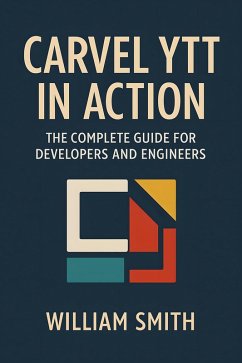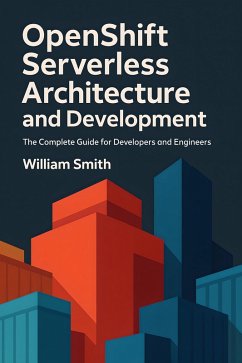
GDB Fundamentals and Techniques (eBook, ePUB)
Definitive Reference for Developers and Engineers

PAYBACK Punkte
0 °P sammeln!
"GDB Fundamentals and Techniques" "GDB Fundamentals and Techniques" is a comprehensive, authoritative guide to mastering the GNU Debugger-one of the most powerful and widely adopted debugging tools in software development. The book meticulously explores GDB's architecture, from its historical origins and internal design to its support for various platforms, programming languages, and debug information formats. Through detailed treatments of user interaction modes and symbol management, readers gain a deep appreciation for how GDB operates at both a high and granular level, laying a rock-solid ...
"GDB Fundamentals and Techniques" "GDB Fundamentals and Techniques" is a comprehensive, authoritative guide to mastering the GNU Debugger-one of the most powerful and widely adopted debugging tools in software development. The book meticulously explores GDB's architecture, from its historical origins and internal design to its support for various platforms, programming languages, and debug information formats. Through detailed treatments of user interaction modes and symbol management, readers gain a deep appreciation for how GDB operates at both a high and granular level, laying a rock-solid foundation for advanced debugging work. With a focus on practical application, the book delves into the entire lifecycle of debugging: instrumentation at compilation, integrating with diverse build systems, and navigating the complexities of modern, concurrent software systems. Step-by-step guidance covers everything from session control, breakpoints, and memory inspection, to advanced workflows for multithreaded programs, remote debugging, and core dump analysis. A dedicated emphasis on scripting, extensibility, and automation empowers users to tailor GDB to their unique requirements-whether optimizing productivity through IDEs and CI/CD workflows, or leveraging Python for custom inspection and visualization. Beyond technical mastery, "GDB Fundamentals and Techniques" addresses the broader context of security analysis, reverse engineering, and best practices in debugging. Readers will discover strategies for diagnosing elusive, catastrophic failures, insights into debugging hardened and adversarial environments, and valuable case studies and comparative analyses with other modern debuggers. The book closes by surveying future directions in debugging and offering guidance on cultivating a culture of excellence, making it an indispensable resource for both aspiring and expert developers seeking to maximize their impact and understanding in complex software landscapes.
Dieser Download kann aus rechtlichen Gründen nur mit Rechnungsadresse in A, B, BG, CY, CZ, D, DK, EW, E, FIN, F, GR, H, IRL, I, LT, L, LR, M, NL, PL, P, R, S, SLO, SK ausgeliefert werden.













